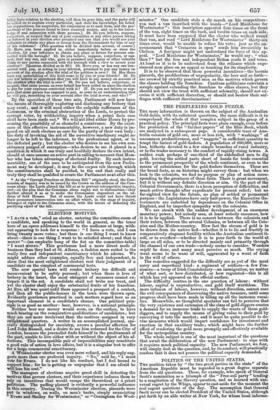THE PERPLEXING GOLD PUZZLE.
THE more information is thrown on the subject of the Australian Gold-fields, with its collateral questions, the more difficult is it to comprehend the whole of that complex subject in the grasp of a practical policy. The principal facts were plain enough, even before the production of the "further papers of the Blue Book, which are analyzed in a subsequent page. A considerable tract of Aus- tralia consists of gold ore, more or less rich, with " washings " of uncommon productiveness, and "nuggets" in sufficient quantity to tempt the laziest of gold-finders. A population of 400,000, more or less' hitherto devoted to a few simple branches of rural industry, or to the trades necessary to the comfort of rapidly-rising towns. A sudden rush perhaps of one-third of the ablebodied men to dig gold, leaving the settled parts short of hands for trade essential to the permanent prosperity of the whole continent, or even to the means of subsistence for the gold-finders themselves. These are the broad facts, as an historian might survey them : but when we look to the colonists, we find no purpose or plan of action corre- sponding to the greatness of those facts. There is great movement, but it is without any definite direction or aim. On the part of the Colonial Governments, there is a keen perception of difficulties, and much active thought after expedients for present relief; but no far-sighted view for the future, no plan of settled or 'permanent purpose : the Legislatures have only half-power, the Executive Go- vernments are enfeebled by dependence on the Colonial Office in England, and by imperfect sympathy with the colonists. We are struck with the sudden development of an enormous monetary power but nobody sees, at least nobody enounces, how it is to be applied. There in no concert between the colonists and their rulers, between the several Colonies, or between all the Colo- nies and the Mother-country. How fast the stream of gold is to be drawn from its native bed—whether it is to lie and fructify in comparatively stagnant fertility within the Australian continent it- self, or to overflow—whether it is to pour forth to the world at large on all sides, or to be directed mainly and primarily through the channel of our own trade—nobody seems to consider. 'Woodard might be done, and many must perceive as much. The crying want seems to be want of will, aggravated by a want of faitt in the will of others.
The remedies suggested for the difficulty are as yet of the most sorry and superficial kind : a regiment of soldiers—a few Pen- sioners—a troop of Irish Constabulary—an immigration, no matter of what sort, or how distributed, or how regulated—this is all which has yet appeared on the official surface. The difficulty centres in the one question of labour : Without labour, capital is unproductive, and gold itself worthless. The mere infusion of labour, however, without direction, cannot cure the evil consequences of discovering the native treasure, until some progress shall have been made in filling up all the immense vacui- ties. Meanwhile, no thoughtful spectator can fail to perceive that the very existence and extension of the class of gold-diggers creates a demand for an immense trade to supply the wants of those gold- diggers, and to supply the means of giving value to their gold by, conveying it into the market; and it must be quite possible to de- vise measures which would impart confidence for investment and exertion in that auxiliary trade; which might have the further effect of rendering the gold more promptly and effectively available for the metropolitan country.
The whole subject is one of the most important of the questions that await the deliberation of the new Parliament: to cope with it requires much political capacity. The new Parliament, we fear, will simply look at the question, and, by its conduct, will practically confess that it does not possess the political capacity demanded.


























 Previous page
Previous page